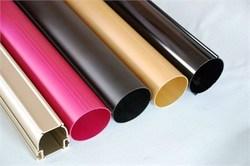

Anodizing (also spelled 'Anodising', particularly in the UK) is an electrolytic passivation process used to increase the thickness of the natural oxide layer on the surface of metal parts.
Aluminium Alloys Are Anodized To Increase Corrosion Resistance, To Increase Surface Hardness, And To Allow Dyeing (Coloring), Improved Lubrication, Or Improved Adhesion. The Anodic Layer Is Non-Conductive.
When Exposed To Air At Room Temperature, Or Any Other Gas Containing Oxygen, Pure Aluminium Self-Passivates By Forming A Surface Layer Of Amorphous Aluminium Oxide 2 To 3 Nm Thick, Which Provides Very Effective Protection Against Corrosion. Aluminium Alloys Typically Form A Thicker Oxide Layer, 5-15 Nm Thick, But Tend To Be More Susceptible To Corrosion. Aluminium Alloy Parts Are Anodized To Greatly Increase The Thickness Of This Layer For Corrosion Resistance. The Corrosion Resistance Of Aluminium Alloys Is Significantly Decreased By Certain Alloying Elements Or Impurities:Copper, Iron, And Silicon, So 2000, 4000, And 6000-Series Al Alloys Tend To Be Most Susceptible.
Manufacturing and supplying door which include industrial aluminium doors, aluminium doors, openable aluminium doors, security aluminium doors, watertight aluminium doors, sliding aluminium doors, aluminium glass doors and watertight glass doors.
More details:View company website
Its Free
Verify Now